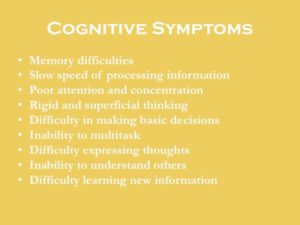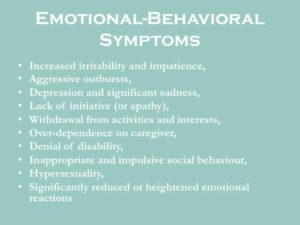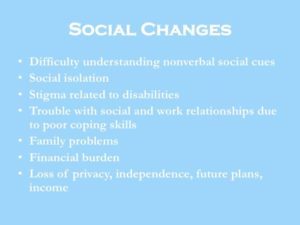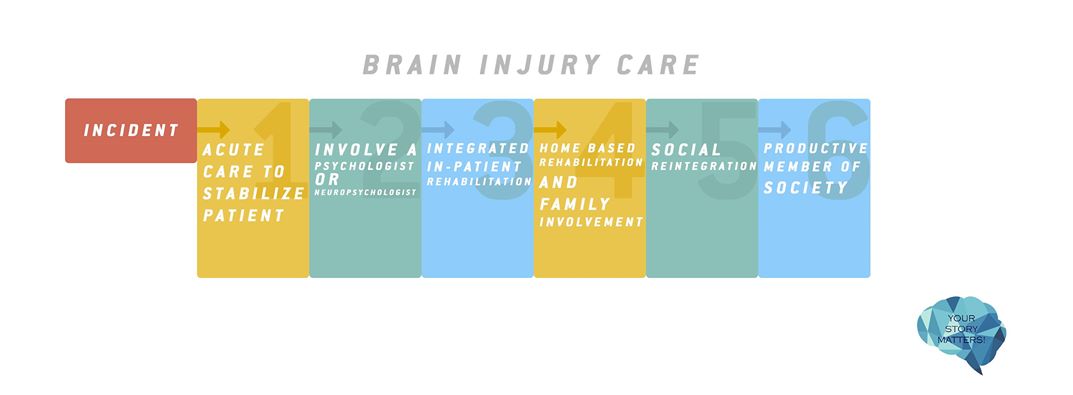Traumatic Brain Injury (TBI) affects an estimated 1.6 million individuals in India every year. In fact, India has been nicknamed the ‘Head Injury Capital of the World’
with a life lost every 8 minutes. Road Traffic Accidents (RTA) cause 60% of TBI injuries in this country. The standard of basic critical care varies greatly throughout the country despite the desperate need and continues to have the maximum impact on outcomes of injury.
Nobody expects an accident, and there is no way of being fully prepared for something like a TBI. However, you can equip yourself with the necessary information that can possibly guide you through the scary and confusing process of dealing with an injured loved one.
The flowchart explains the ideal continuum of care and suggests steps to ensure best possible treatment. The first step after the ‘incident’ would be Acute Care in order to medically stabilize the patient. Once the immediate medical symptoms have been taken care of, the doctors will check for neurological symptoms. Such symptoms can vary, however, some of the common ones are:
Seizures
Hemorrhages
Coma
Dizziness
Nausea and Vomiting
A consulting neurologist could recommend tests such as, a CT or an MRI scan. The next step is to check for any early psychological and cognitive symptoms. Some of the early symptoms include:
Complete lack of awareness of injury
Disorientation and confusion about time, place or person
Aggressive outbursts
Repetition of conversations or questions
To alleviate these symptoms it is important to involve a psychologist and a neuropsychologist in the care. This is when the early intervention begins; it can involve a team of specialists working together that include a physiotherapist, an occupational therapist and a speech and language pathologist.
After being discharged from the hospital, the patient should move to an integrated inpatient rehabilitation unit (such as, the Department of Rehabilitation, Sir H.N Reliance Foundation Hospital and Research Centre, Mumbai). The duration of the inpatient rehabilitation will depend on the severity of the symptoms and extent of injury.
Rehabilitation after a brain injury is a long process and the next step for recovery is home-based rehabilitation. Many a times, it becomes necessary to provide 24-hour care (e.g.- a ward boy or nurse). Home-based rehabilitation continues to include the team of therapists. The role of the neuropsychologist is to help with the retraining of cognitive functions and the role of a psychologist is to counsel the emotional and social difficulties. The success of home-based rehabilitation greatly depends on the involvement of the family members. The patient needs the support system, motivation, guidance and stability that family members can provide.
The following are some of the difficulties/symptoms that patients can face:



Some studies suggest that 40% to 70% of caregivers show depressive symptoms. Early interventions such as, counseling or healthy stress management can help prevent these.
As neuropsychological rehabilitation continues, the goals of the rehabilitation process change based on the progress made by the patient.
Social Reintegration: The individual has now come a long way, and societal participation can be an enriching step for her/him as well as the family. After this step has been achieved, the final goal of the rehabilitation process is addressed. Becoming a productive member of society often involves returning to work albeit, in a modified capacity.
The period after an injury can be a frightening reality for the family and it is easy to dwell on the worst possibe outcome. However, TBI doesn’t have to be the end of the road; recovery is possible. The family’s role in recovery is fundamental to the progress of the patient. They can provide the necessary nurturing environment and hopeful outlook to facilitate the rehabilitation program.

Authorship: ‘Caring for Someone with Brain Injury’ is written by Rahat Sanghvi, for Synapsium Brain Health Clinic, Mumbai. Shraddha Shah founded Synapsium Brain Health Clinic in 2013 where a team of psychologists work to provide various neuropsychological and psychological services. Shraddha is a clinical psychologist specializing in neuropsychology. She is currently serving as a private consultant at Jaslok Hospital & Research Center and Sir H.N. Reliance Foundation Hospital. She is also a visiting faculty member at S.N.D.T. University. Shraddha trained in Neuropsychological Rehabilitation under renowned neuropsychologist, Dr. Barbara Wilson and her team from United Kingdom. She has also received training and experience in Neurorehabilitation as an intern at the well-known Rusk Institute of Rehabilitation, New York.

